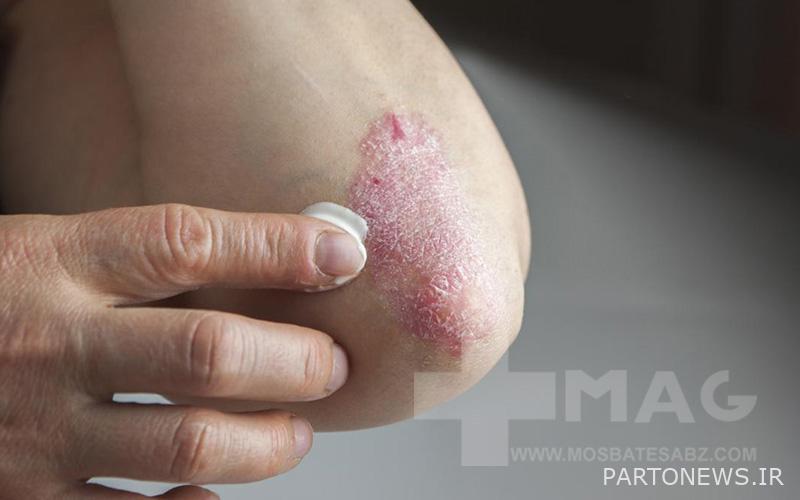Which skin problems are caused by vitamin deficiency?

When nutrients are depleted in the body, you may experience symptoms that you did not have before. Sometimes these symptoms appear on the skin. So you may be able to compensate for many skin problems by compensating for the lack of vitamins and minerals in your body and taking the best multivitamin pills. In this article, we will introduce you to the symptoms of vitamin deficiency in the skin; Stay with us.
What we read in this article
Risk of vitamin deficiency and increased skin disorders
You can find the cause of many skin disorders in vitamin deficiencies. Deficiencies of water-soluble vitamins such as vitamin C and B vitamins usually show up in a short period of time. In other words, if you do not take these vitamins daily for only a short time, you will probably notice the symptoms of this deficiency quickly. But fat-soluble vitamins A, D, E, and K may take up to a year for symptoms to show up. Because these vitamins can be stored in the body. Symptoms of many vitamin deficiencies may include red skin rash, seborrheic dermatitis, and fungal infections. Of course, skin, hair and nails are usually related to each other. This means that if skin disorders occur, the person will probably face other problems such as hair loss or brittle nails.
Symptoms of vitamin deficiency in the skin
In this section, we will introduce some skin problems that are related to vitamin deficiency:
Pale skin due to iron deficiency
Decreased oxyhemoglobin in the skin causes discoloration of the skin. Anemia is the most important cause of pale complexion. Anemia is associated with iron deficiency more than anything else. However, lowering the levels of other nutrients such as zinc, vitamin B12, vitamin B6 and folate can also play a role in anemia and cause pallor. The first thing that is recommended for you to fight anemia is definitely iron tablets.
Delayed wound healing and deficiency of vitamin C and zinc
Impaired healing of wounds in the body may be a sign of vitamin deficiency in the body. Research shows that a lack of protein, vitamin C and zinc is directly related to delayed wound healing. If the serum albumin level is less than 3.5 mg / dL and the total lymphocyte count is less than 1,500 per cubic millimeter, the person will no doubt be delayed in wound healing. In these cases, it is better to buy zinc pills and also increase the sources of vitamin C in your diet.
Association of dermatitis with vitamin deficiency
Dermatitis means inflammation of the skin. As a result of inflammation, the skin becomes dry, swollen and red, and usually itchy. Dermatitis may sometimes manifest itself as scaling of the skin. There are different types of this disease, the most important of which are atopic dermatitis (eczema), contact dermatitis and seborrheic dermatitis. Studies show that there is a link between dermatitis and nutrient deficiencies. Deficiency of protein, deficiency of essential fatty acids such as omega-3, as well as deficiency of vitamin B3 and zinc can play a role in the development of dermatitis. Fortunately, dietary supplements can be used to compensate for the lack of any of these nutrients. For example, omega-3 deficiency can be easily compensated by taking omega-3 pills.
Seborrheic dermatitis and deficiency of vitamin B6 and biotin
We said that one of the most important types of dermatitis is seborrheic dermatitis. It is an inflammatory disease of the skin that causes flaking of the skin and in areas where there are sebaceous glands, the skin turns yellowish white. Each of these symptoms can be a sign of a vitamin deficiency in the skin. Studies show that vitamin B6, biotin and zinc deficiency is directly related to seborrheic dermatitis.

What is petechiae and what does it have to do with vitamin deficiency?
Related Posts
Petechiae are small red or purple spots that appear 1 to 2 millimeters in size on the skin. The cause of petechiae is minor bleeding due to damage to capillary blood vessels. Petechiae can be caused by a lack of vitamin B3 (niacin) as well as a lack of vitamin C in the body.
Follicular hyperkeratosis
It is a skin condition characterized by excessive growth of creatine in the hair follicles. As a result of follicular hyperkeratosis, reddish-brown follicular papules with central keratotic plugs will develop. In this complication, the follicle pores are often closed with a white plug of sebum. Deficiency of several vitamins can lead to follicular hyperkeratosis; Deficiencies of vitamins A, B and C. In addition to vitamins, taking supplements that contain essential fatty acids may also be effective in eliminating this disease.
The most important vitamins affecting skin problems
Get to know the most important vitamins that are involved in skin disorders:
Zerosis and vitamin A deficiency
Zerosis is an abnormal dryness of the skin and its mucous membranes. This condition can cause scaling, itching and even cracking of the skin. Vitamin A deficiency as well as zinc deficiency may play a role in cirrhosis.
Vitamin B3 deficiency and skin disorders
Another name for vitamin B3 is niacin. This vitamin is water soluble and plays an important role in cellular metabolism. Plague is a disease that occurs as a result of chronic niacin deficiency in the body. The most important symptoms of plague are diarrhea, dermatitis and dementia. Plague is dangerous and can even lead to death. Skin lesions in pellagra are more likely to occur in areas that are exposed to sunlight. Niacin deficiency is associated with many skin problems.

Reduction of vitamin A equals skin problems
Vitamin A plays an important role in the maintenance of epithelial tissues. You can find this vitamin in abundance in fish oil, egg yolks and butter. You may think that vitamin A deficiency only causes eye and vision problems; While this is not the case. Vitamin A deficiency can be associated with increased flaking of the skin as well as increased wrinkles.
What are the symptoms of vitamin C deficiency in the skin?
Vitamin C is a cofactor in many collagen synthesis reactions and plays a key role in the formation of collagen and amino acids. This vitamin is also a powerful antioxidant and in addition to improving the function of the immune system, it also plays a role in accelerating wound healing. Rough and dry skin, follicular hyperkeratosis, petechiae and easy bruising of the skin are skin symptoms associated with vitamin C deficiency in the body. Other symptoms of vitamin D deficiency include weakness and fatigue, weight loss, and recurrent infections.
The role of zinc in skin health
Zinc plays an important role in many biochemical reactions. In addition to contributing to hair loss, low levels of this mineral can also cause skin problems. Dry skin, seborrheic dermatitis and wound healing disorders are among the most important skin problems associated with zinc deficiency in the body.
Concluding remarks
It shows many symptoms of vitamin deficiency in your skin. In this article, we have explained the relationship between nutrient deficiency and skin problems. With proper nutrition, you can eliminate the lack of vitamins and minerals in your body and help improve your body’s health. You can also get help from dietary supplements such as multivitamins.
Please rate this article
[مجموع: ۱ میانگین: ۵]


